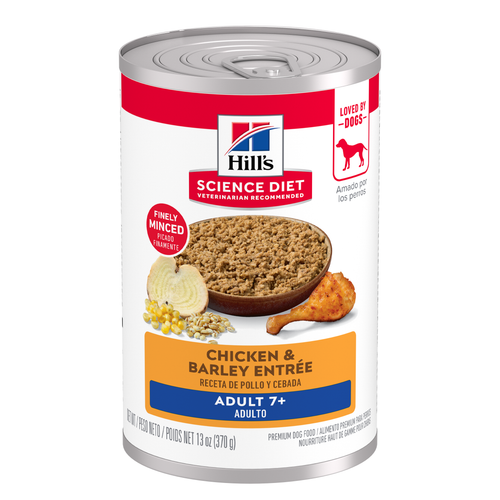
-
Find the right food for your petTake this quiz to see which food may be the best for your furry friend.Find the right food for your petTake this quiz to see which food may be the best for your furry friend.Featured products
 Adult 7+ Chicken & Barley Entrée Dog Food
Adult 7+ Chicken & Barley Entrée Dog FoodChicken & Barley Entrée in a delicious loaf with precisely balanced nutrition to support mobility and muscle mass for older dogs
Shop Now Adult Chicken & Barley Recipe Dog Food
Adult Chicken & Barley Recipe Dog FoodSupports lean muscle and beautiful coat for adult dogs
Shop Now Adult Large Breed Chicken & Barley Recipe Dog Food
Adult Large Breed Chicken & Barley Recipe Dog FoodSupports healthy joints, lean muscle, and beautiful coat for large breed dogs
Shop NowFeatured products Adult Turkey & Liver Entrée Cat Food
Adult Turkey & Liver Entrée Cat FoodPrecisely balanced nutrition with the delicious taste of minced turkey & liver to help fuel the energy needs of cats during the prime of their life
Shop Now Senior Vitality Adult 7+ Tuna & Vegetables Stew
Senior Vitality Adult 7+ Tuna & Vegetables StewImproves Everyday Ability to Get Up & Go
Shop Now Adult 7+ Indoor Chicken Recipe Cat Food
Adult 7+ Indoor Chicken Recipe Cat FoodSupports energy level and beautiful fur in mature indoor cats
Shop Now -
Dog
- Dog Tips & Articles
-
Health Category
- Weight
- Food & Environmental Sensitivities
- Urinary
- Digestive
- Joint
- Kidney
-
Life Stage
- Puppy Nutrition
- Adult Nutrition
- Senior Nutrition
Cat- Cat Tips & Articles
-
Health Category
- Weight
- Skin & Food Sensitivities
- Urinary
- Digestive
- Kidney
-
Life Stage
- Kitten Nutrition
- Adult Nutrition
Featured articles How to Properly Mix Wet & Dry Pet Foods
How to Properly Mix Wet & Dry Pet FoodsAn Orange cat eating from a bowl filled with mixed food
Read More The Science Behind Our Love for Pets
The Science Behind Our Love for PetsLearn the scientific reasons why we have such strong connections with our pets, and what science says about the love between humans and our furry friends.
Read More What Is Littermate Syndrome? Pet Adoption Guide
What Is Littermate Syndrome? Pet Adoption GuideLearn more about littermate syndrome in dogs and cats and how to successfully navigate adoption and early socialization processes.
Read More -


When you called your neighbor this afternoon to see if she'd like to take a walk over to the dog park — with both of your pets, of course — you were shocked to learn that both your friend and her dog wouldn't be able to attend. She just returned home from the veterinarian's office after learning that her dog has heartworms, and she wanted him to relax and recuperate.
Now, you've heard the term, but you're not quite sure what happens with heartworms in dogs. Will her dog be alright? Could her pet have infected yours?
What Are Heartworms in Dogs?
Heartworm disease is a serious condition in which a parasite called Dirofilaria immitis takes up residence in your dog's body, specifically in his heart, lungs and associated blood vessels. This condition is serious as it can cause heart failure, lung disease and possibly even death, while also exacerbating other conditions.
Are you wondering if heartworms are in fact actual worms that are living in your dog's body? Well, yes. As gross as that may sound, these parasites develop from larvae into adult worms. According to the U.S. Food and Drug Administration (FDA), they can live for five to seven years in your dog's body, and grow four to six inches long in males and ten to twelve inches in females. Take a second to digest that information!
How Can Your Dog Get Heartworms?
Heartworm disease is spread when an infected mosquito bites a dog, leaving behind microfilariae, which then become larvae and mature into adult heartworms. After mating with a male heartworm, the adult female discharges offspring into the dog's bloodstream, continuing the life cycle yet again.
The good news is that infected dogs are not contagious (so, your friend and her pet could have gone to the dog park with you!). An infected dog cannot get any other dogs sick just by being around them. The other dogs would need to get bit by an infected mosquito to contract heartworm disease themselves.


Tasty Tips
Look Out for These Heartworm Symptoms
According to the FDA, there are four stages of heartworm disease, and symptoms appear differently in each stage. In Class 1, you may not notice any symptoms, and if you do, it would only be a light cough. Class 2 is when symptoms start to appear. You might notice that your dog is more fatigued after being active or you may notice an occasional cough. Class 3 symptoms will be more obvious and include a persistent cough. Your dog will also tire after just light activity. You may also notice some trouble breathing with a Class 3 diagnosis.
Finally, there's Class 4, also known as caval syndrome. This occurs when there are so many worms that they block the blood flow back to your dog's heart, and it requires immediate surgery. Class 4 disease is fatal if untreated. Not all dogs with heartworm disease develop into this stage, but it's important to identify what class a dog may be experiencing so that it doesn't potentially develop into the worst-case scenario.
If you're ever concerned that your dog is experiencing any heartworm symptoms, it's important to make an appointment right away with your pet's veterinarian. The vet will draw blood to check for the presence of a heartworm infection in your dog. If your dog is infected, he or she can then recommend medicine or surgery for treatment, depending on how ill your dog is.
How Can You Prevent Heartworms?
The good news is that there are medications your dog can take to prevent heartworm infection. Your vet can prescribe a topical agent or oral pill to be taken every month. It's important to work all year long to prevent heartworms (even if there are no mosquitoes flying by in the winter), so try not to miss a dose to keep your dog safe and healthy. With diligent prevention, you may never even have to worry, but it's always smart to be on alert for any health changes in your pets. For more information regarding heartworms you can visit the Heartworm Society website. Also, be sure to talk to your vet at your pup's next checkup about heartworm testing and prevention to ensure your pup stays as healthy as possible.


Erin Ollila believes in the power of words and how a message can inform—and even transform—its intended audience. Her writing can be found all over the internet and in print, and includes interviews, ghostwriting, blog posts, and creative nonfiction. Erin is a geek for SEO and all things social media. She graduated from Fairfield University with an M.F.A. in Creative Writing. Reach out to her on Twitter @ReinventingErin or learn more about her at http://erinollila.com.
Related products

Supports healthy joints, lean muscle, and beautiful coat for large breed dogs

Chicken & Barley Entrée in a delicious loaf with precisely balanced nutrition to support mobility and muscle mass for older dogs

Supports lean muscle and beautiful coat for adult dogs

Chicken & Beef Entrée in a delicious loaf with complete & balanced nutrition to help keep adult dogs active and healthy
Related articles

Wondering where can I buy a dog? Consider adoption and explore the pros and cons of adopting a dog from a breeder versus an animal shelter.

Learn how to help keep your dog's immune system in tip-top shape, including nutritional immune system support for dogs and other strategies.

Discover how the field of dog science is giving us more and more insights into the inner workings of our furry best friends.

Your dog's coat and skin are a big part of your dog's overall health. Ensure you keep your dog's coat healthy, by following these simple tips.

Put your dog on a diet without them knowing
Our low calorie formula helps you control your dog's weight. It's packed with high-quality protein for building lean muscles, and made with purposeful ingredients for a flavorful, nutritious meal. Clinically proven antioxidants, Vitamin C+E, help promote a healthy immune system.
Put your dog on a diet without them knowing
Our low calorie formula helps you control your dog's weight. It's packed with high-quality protein for building lean muscles, and made with purposeful ingredients for a flavorful, nutritious meal. Clinically proven antioxidants, Vitamin C+E, help promote a healthy immune system.


